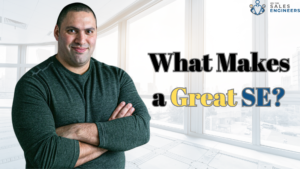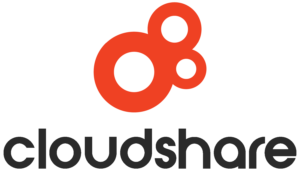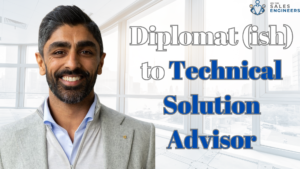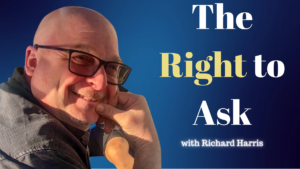
This show is sponsored by:

CloudShare makes it easy to replicate complex IT environments in the cloud— so you can deliver virtual training, sales demos and POCs, without compromising time to market
Get Your Free Trial of CloudShare
To say that the Sales Engineer’s role is demanding might be an understatement. As a Sales Engineer, you need to have a thorough technical expertise of your solution so that you can explain to customers how they work and how it can best solve your customers’ problem. Preparing for product demos and presenting to potential buyers on a regular basis can be very time-consuming and not to mention, pretty exhausting. Fortunately, our guest today has found a way to make selling simpler, easier, and more effective for both the sales team and the buyer.
Garin Hess is the CEO and founder of Consensus, an intelligent demo automation software for sales leaders, and the author of the book Selling is Hard, Buying Is Harder. In this episode, Garin helps us understand the buyer’s journey and what that means for us Sales Engineers. We also talk about how sales teams can shorten B2B sales cycles and drive sales more effectively by equipping the right people promoting their solution and improving the customer’s buying experience.
Key Takeaways:
Join us in our conversation and learn:
- Why exactly is the B2B buying process more complicated than selling
- Why Garin is all about shifting from a sales-focused approach to the DEEP-C buyer enablement model
- The six essential types of demos most buyers or stakeholders must go through to reach a decision
- How to guide the buyer to effectively decide and coach them throughout the buyer’s journey
- How to equip the sales champion to have an edge over other vendors
- Another ROI that most sales engineers and salespersons forget that they can greatly impact the buyer’s decisions
- Different ways to deal with the customers or prospects’ emotional ROI
- How most Sales Engineers and salespeople fail as a team and how they can improve
Quotes:
How to sell in the gap: “We have this concept called selling in the gap (where these gaps are between the time you meet with the buyer and the time you meet with them again). What can you give them between that time that they’re talking with other stakeholders? First of all, you have to understand who they’re going to, what that role is all about, you need to understand what that role’s primary concerns and questions are gonna be, you’ve gotta understand what stage they are so you give them the right kind of content.”
How to be a vendor that stands out: “The thing that makes a champion really love you as a vendor is trust and empathy… having that empathy and being able to do things that really build their trust and part of that is supplying them and coaching them because most other vendors are not gonna do that.”
What buyer enablement really means: “Buyer enablement is to actually care about your buyer. If you don’t actually care about the buyer and all you care about is getting the deal, you may as well focus on selling and not buyer enablement. But when you’re sincere, one of the things that can really help is just thinking about what the buyer’s going through.”
On emotional ROI: “There’s so many things to consider, but that emotional ROI is a little bit of a framework for thinking about how to empathize with them. What are the difficult emotions they’re gonna have to go through and what are they gonna get out of it? It’s not just about your product, it’s also about implementation… how hard is it gonna be for them to implement? Do they have a lot of other projects on their plate? Do they have to fight a political battle and be emotionally draining to get this broad end? If so, that emotional cost goes up, and up, and up, and up, no matter how good your product is or the price is, if that emotional cost is too high and they don’t see an ROI on it in their own mind, then you don;t have a chance.”
How to deal with the buyer’s emotional ROI: “By putting specifics around it, it stops being this big unmanageable monster in their mind and they can say, Oh, okay, I’ve gotta put in 15-20 hours in that first month. These are my tasks. I can deal with that. If you don’t address it that way, if you’re not thinking about that, that emotional ROI calculation in their heart and mind, may just put you out of the running.”
“You just might be the change agent to help flip the perception and the framework around from a selling mode to a buyer enablement mode, as a sales team, it could be the salesperson and the SE.”
On who’s the real closer: “The buyer is the closer. Who’s really responsible for making the choice – it’s the buyer!… It’s not about selling, it’s about educating and guiding and facilitating and helping. You’re that guy, you’re taking them through the jungle and it’s dangerous and they don’t even know it, and if you do a good job. they’re gonna buy it from you. And if you don’t, they’re gonna buy from someone else.”
Not So Fire Round
- What do you love about Sales Engineering that made you wanna help them?
I love that consultative experience, and I love the technical aspect, and being able to come up with creative ways to meet the customer’s needs. But the other reason I love and really focused on Sales Engineering is because in my previous SaaS company, I did 6 demos back-to-back and I thought, this is not something a human should do because it’s demoralizing, and I thought SEs are better. I really believe in all of us trying to rise to our potential and doing repetitive demos is not rising to our potential. Having felt that experience firsthand, I decided I’ve gotta figure out how to automate some of this so that people can spend more of their time being more effective.
- What would you change about Sales Engineering?
I don’t know what I would change much other than I would change the world to appreciate Sales Engineers more. Because SEs are so essential and yet they just are kind of considered by a lot of the management as sort of a necessary evil. We shouldn’t have to pay for these expensive guys, but we do… and I think that’s a disservice.
- Other than your book, is there a book or resource you would recommend to Sales Engineers?
Mastering Technical Sales: The Sales Engineer’s Handbook 3rd Edition by John Care
Great Demo: How to Create and Execute Stunning Software Presentations by Peter Cohen:
- What separates a great Sales Engineer from the not so good ones?
Buyer’s perspective. Are we focused on ourselves or are we focused on the buyer? I would say SEs are more focused on the buyer than the salespeople, however, what often happens is just product-focused because we love our products, we love our solutions, we can get sucked into that hole. There’s a big gravitational draw there and the very best ones can resist that draw and really stay focused on the customer and the buyer’s experience.
Links:
To learn more about Consensus and download resources and webinars, visit the website: https://www.goconsensus.com/
Connect with Garin Hess on Linkedin
If you enjoyed this podcast, please support the show by dropping a review or rating on iTunes. https://podcasts.apple.com/us/podcast/we-sales-engineers-resource-for-sales-engineers-by/id1378292171
And if you’ve been affected by COVID as an SE, please check out our Leave No SE Behind initiative so that we can help you. https://wethesalesengineers.com/no-se-left-behind-initiative/




This Post Has 2 Comments
Pingback: 4/1/1 Life is Hard Enough, Make Your Customer's Life Easier | We The Sales Engineers
Pingback: #156 Salary And Workload: Research Your Worth | We The Sales Engineers